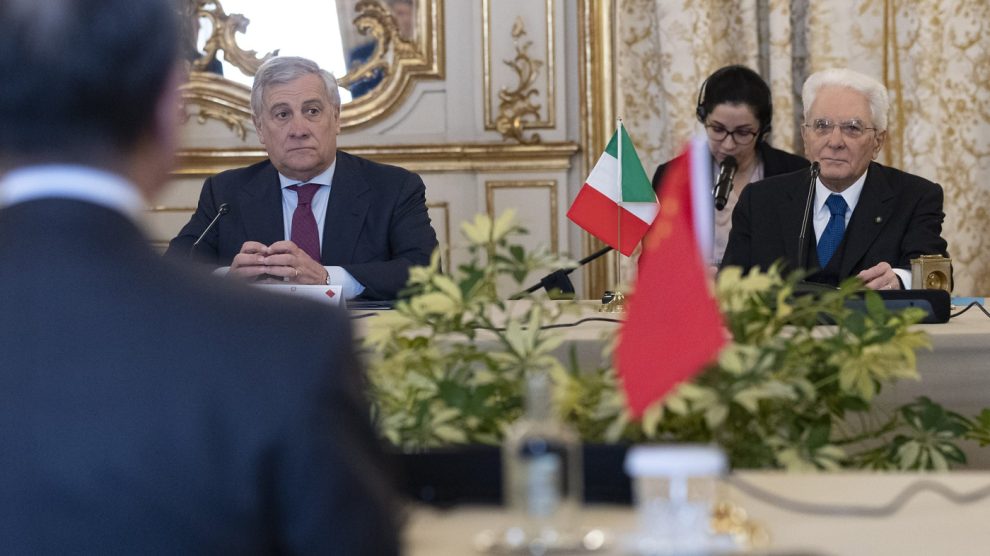Wang Yi’s Rome stopover. The head of diplomacy of the Chinese Communist Party (and former foreign minister) is on a European tour. On Thursday he was in Rome, where he met with FM (and deputy Prime Minister) Antonio Tajani. And he also shook hands with President Sergio Mattarella.
- Earlier, Mr Wang was in Paris, where he met with European Minister Catherine Colonna and President Emmanuel Macron. His next stops will include Hungary, the Munich Security Conference – where he’ll be the key speaker at the “China in the World” panel – and Russia.
Belt and Road (and visits). FM Tajani and Mr Wang spoke of preparations for PM Giorgia Meloni’s trip to Beijing, following President Xi Jinping’s invitation at the bilateral meeting the two leaders held on the sidelines of the G20 in Bali, Indonesia. They also touched upon the future of the Belt and Road Initiative.
- PM Meloni called the 2019 Memorandum of Understanding – by which Italy became the first and only G7 country to adhere to the BRI – “a big mistake”. The MoU expires in March 2024, but it will automatically renew at the end of 2023 unless otherwise specified.
- Before the meeting, the Italian FM noted it was “still premature to talk about the Silk Road agreement” as “there are other urgencies and emergencies.”
- As Enrico Fardella (associate professor at the University of Naples L’Orientale and director of ChinaMed) told our sister website, quiet consent could turn out to be the most practical solution. “Perhaps it could allow [Italy] to maximise the benefits by keeping the MoU as a dead letter if necessary or exhuming it according to convenience.”
Betting on the economy. “China is willing to import more high-quality Italian products, to support Italian companies in expanding their market shares in China, and hopes that Italy will provide a fair, transparent and non-discriminatory business environment for Chinese companies,” tweeted the Chinese Ambassador to Rome Jia Guide, who recently stressed the MoU’s importance.
- The first part of the sentence is an olive branch to Italy (in 2019, the government that signed the MoU pitched it as a way to relaunch exports – a thesis that didn’t hold up to reality)…
- … while the second is a clear request, referring to the trade barriers posed by the Italian government with its special powers – which former PM Mario Draghi has strengthened.
How Xi wants to court Meloni… In China’s eyes, France and Italy are somehow linked. This is demonstrated by Mr Wang’s visit to Paris on Wednesday, before he travelled to Rome, and before the commitments in Germany first and Hungary later. And by an important decision President Xi had announced at the November G20 in Bali: the go-ahead to purchase by 2035 at least 250 ATR aircraft, owned by Italy and France (Leonardo and Airbus), after three years of negotiations.
- A few days earlier, China had certified the ATR 42 regional turboprop produced in the Southern Italian plant of Pomigliano d’Arco plant. For Beijing, that was an example of how collaboration should take place. For Rome, it was a step towards access to the Chinese market and equal treatment for companies. But is it possible to untie politics from business when China is at stake?
… and what China wants. As US President Joe Biden appears to be de-escalating the spy balloon confrontation, there could be more room for relations between the European Union and China. And that’s certainly alluring to President Xi, who’s seeking to strengthen cooperation with European nations. Ultimately, the core message that Mr Wang is carrying in the heart of Europe is that China wants to untie geopolitics from business to allow for what it calls a “win-win” cooperation.
However, things are very different from when Mr Wang last visited as FM in 2020. On the one hand, the EU is firmly on Ukraine’s side in its war against encroaching Russia, China’s strategic partner. And the latter has become more assertive in its neighbourhood. As FM Tajani recently declared, “there must be no temptation to do what Russia has done in Ukraine elsewhere,” and Taiwan “must remain as it is.”
- Both FM Tajani and President Macron told Mr Wang that China must pressure Russia into sitting at the negotiating tables and finding a diplomatic solution to the war in Ukraine. That is, for Beijing to be a responsible actor in a tense international scenario where the downed flying objects have rekindled tensions.
Down to the wire. The anniversary of the Russian invasion of Ukraine is next week, on February 24. And no one in the West had forgotten that a few days before the start of the war, President Xi had signed an “unlimited” partnership with Russian President Vladimir Putin.
- FM Tajani noted that the diplomat “told him that Xi Jinping will make a peace speech on the anniversary of the conflict.” That would mark a shift from Beijing’s long-held disengagement strategy and would also double as a Chinese signal to the West.





